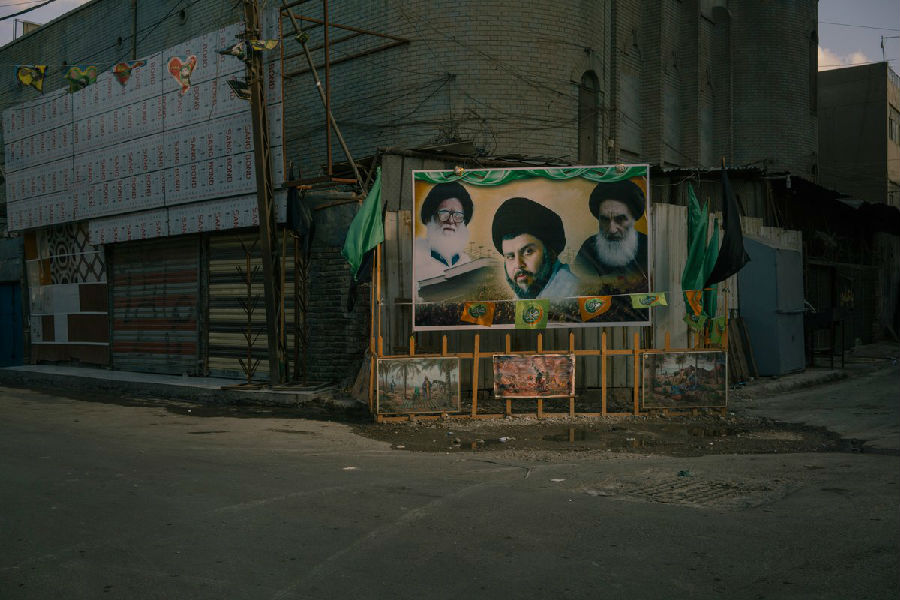戰后生活
Fifteen years on from the U.S. invasion and with ISIS in retreat, Iraq is trying to build a peace that lasts
美國入侵15年后,隨著ISIS的撤退,伊拉克正努力建設一個持久和平的伊拉克
By Vivienne Walt/Baghdad
文/(巴格達)薇薇恩·沃爾特
On a crisp afternoon in late winter,
在隆冬時節一個清爽的午后,
Bassem Qassim, a 55-year-old militia fighter, drives past a checkpoint on the edge of Baghdad,
55歲的民兵巴西姆·蓋西姆開車駛過巴格達邊界的一個檢查站,
where the city’s clogged traffic gives way to sheep grazing and villagers tending small crops next to their houses.
這里沒有了城市堵塞的交通,只有放牧的羊群和村民房前屋后的小片莊稼地。
A couple of dozen miles farther, he stops the car in a tiny hamlet
蓋西姆繼續開出幾十英里后把車停在了一個小村莊里,
to show how perilously close the Islamic State came to taking the Iraqi capital during its stampede into the country in 2014.
隨后他向我們展示了ISIS2014年涌入伊拉克時如何距離攻陷伊拉克首都僅差一步之遙。
He points to a cluster of trees on the edge of a small community.
他指著一個小村落邊緣的一片小樹林,
"They were right here,” says Qassim, who fought a fierce battle against the jihadists for 3.5 years.
說到,“他們都已經到那兒了,”他曾與圣戰分子激戰了三年半之久。
This was our line of defense."
“我們的防線就設在這兒的。”
The sleepy dot on the map does not look like a war front.
地圖上那個沉睡的點看著并不像什么前線。
And yet, after years of conflict, countless fault lines like this crisscross Iraq,
然而,經過多年的混戰,伊拉克境內這種壕溝已經到處都是,連數也數不清了,
leaving riven communities and millions of upturned lives in their wake.
社區因此變得四分五裂,數以百萬計的百姓的生活也隨之發生了天翻地覆的變化。
Now, as the country digs out from its grueling war against ISIS,
如今,該國終于從與ISIS的嚴酷戰爭中抽出身來了,
it is trying to forge from its victory a lasting peace
它正努力在戰爭勝利后創建一個持久和平的國家,
for the first time since the U.S. led a military invasion of Iraq in March 2003, in defiance of the U.N., to overthrow the autocrat Saddam Hussein.
這還是自2003年3月美國無視聯合國,率領軍隊入侵伊拉克以推翻薩達姆·侯賽因的獨裁統治以來,該國首次做出這樣的舉措。
Fifteen years on, TIME returned to Baghdad to speak to Iraqis of almost every stripe,
十五年過去了,此次,本刊記者重返巴格達,采訪了各個階層的伊拉克人,
from battle-hardened fighters and grieving civilians to Prime Minister Haider al-Abadi.
從久經沙場的士兵,到悲傷的平民,到總理海德爾·阿巴迪。
All are trying to determine how they can finally prosper, and whether this relative calm can last.
所有人都想知道他們究竟要怎樣才能重振旗鼓,想知道這種相對的平靜能否持續。

Having all but obliterated ISIS’s caliphate, Iraqis are grappling with a question that had largely receded during years of fighting,
除了被消滅的ISIS哈里發之外,伊拉克人正在努力解決一個在多年的戰爭期間很大程度上已經退到幕后的問題,
and that now looms large over the parliamentary elections scheduled for May 12:
這一問題也將成定于5月12日舉行的議會選舉的一個主要問題:
Can their country emerge as a functioning democracy, with its Shi'ite, Sunni and Kurdish populations relatively united?
他們的國家能否成為一個運轉正常,什葉派,遜尼派和庫爾德人口相對團結的民主國家?
And can it do that without the safety net of the U.S. military?
伊拉克能否在不依靠美國的安全網的情況下做到這一點?
If it succeeds—and it is a big if—
如果做到了 - 這是一個很大的假設-
Iraq could become that beacon of freedom that U.S. officials once promised 15 years ago, in arguing for a war many now regard as a disastrous decision.
她將成為一座自由的燈塔,一座15年前美國官員為發動戰爭,這場戰爭被當今很多人都視為災難性的決定,辯解時就曾許諾他們的自由燈塔。
"We have sacrificed a great deal of blood and treasure for the future of Iraq,” says Lieut. General Paul Funk, the top U.S. commander in the country.
“我們為伊拉克的未來犧牲了大量的生命和財富,”美國最高指揮官,陸軍中將保羅·芬克說到。
He believes that under ideal circumstances, Iraq could act as a multiethnic buffer between the region’s bitter rivals,
他認為,在理想的情況下,伊拉克可以在該地區激烈競爭的兩大對手之間扮演一個多民族緩沖器,
both of which are Iraq’s neighbors: Shiite-dominated Iran and Sunni-dominated Saudi Arabia.
這兩大對手都是伊拉克的鄰國:一個是什葉派主導的伊朗,一個是遜尼派占主導地位的沙特。
"I see in Iraq the future of the Middle East," he says.
“我覺得中東的未來在伊拉克,”他說。
Yet if Iraq fails and slips back into conflict, the country could again play host to the region’s violent proxy wars—
然而,如果伊拉克重振失敗并再次陷入沖突的話,該地區殘酷的代理人戰爭可能會再次在伊上演——
potentially embroiling the U.S. in a yet another protracted engagement.
美國也可能再次卷入一場曠日持久的戰爭。
Already, ISIS survivors have begun to launch attacks, and Iraqi leaders believe that they are attempting to regroup.
目前,ISIS余孽已經開始發動進攻了,伊拉克領導人認為這些人正在試圖重新集結起來。
No country can withstand such onslaught,” al-Abadi tells TIME.
“沒有哪個國家能夠承受這種攻擊,”阿巴迪告訴《時代周刊》。
譯文由可可原創,僅供學習交流使用,未經許可請勿轉載。


